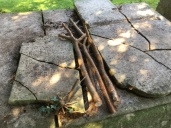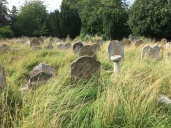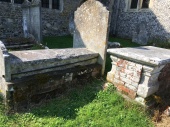My previous public review of this Aickman story in 2007 …
It is one of his longest stories. Which is sort of relevant. When I started reading it, the glanced-at length seemed about average for Aickman – but as I continued reading it, and looking, from time to time, at the pages still to read, it seemed bodily to grow, as if the act of reading made it longer. A bit like the very British committee system embodied in its plot, the cemetery committee itself that is the centrepiece, reminding me of Jarndyce & Jarndyce or of a meal at Aickman’s own Hospice. I mean this quite seriously … and this seemed to be confirmed by the story’s coda with these words: “Everyone perceived that the past should be allowed to merge into the future, with no official recognition given to an interregnum.”
Indeed Jarndyce & Jarndyce, and today I recognise this is represented by the two characters Jonas and Jarman!
But I did not know half of of it then, I see, having just reread it in the light of all his other stories recently re-read…
RESIDENTS ONLY by Robert Aickman
“…the future would have to be left to time.”
“What I mean is we do not end the fact and responsibility of immortality by setting up a committee.”
The ultimate Null Immortalis story, of quaintly attritional entropy, when you can’t even die off from being a member of the oldest local committee of all, aptly, in this town, the cemetery committee! You must all know this story; it’s probably been around your veins countless times, even if these veins ever carry today even more sluggish currents than heretofore. Crickmay himself, despite his initial youth, half-sees things through myopic eyes, I now realise. That may explain a lot. The Rogerson caretaker in the cemetery’s lodge, for whom Crickmay is responsible, and Rogerson is now just the smouldering red glow of a bigger fire to come if you believe in the ending or any endings at all, a red glow to show Rogerson is still there at the depths of the cemetery. This is not just a satire on the mechanics of ancient committees, and I would say it is not a satire at all, even if Aickman intended it. It is far more serious than that. It is life and death itself, whatever other ludicrous or absurdist cast you place on it. Boys will always be boys, even Murch, as they keep an eye on the cemetery but fear its ghosts. Glad to be reminded of Mr Yarwood, who can have no imitation. Though Rogerson may have mimicked him, for all we shall ever know.
“Keep soldiering. That’s what we all have to do in our different ways.” My way is to study the minutiae of Aickman’s own stories of Null Immortalis. The actual state of this cemetery preceded today’s fashion of rewilding policies, with long grass, masonry cracks and mis-leanings and even skeletal fingers protruding. Sleepers settled below and now some are above ground. ‘Tramping through tall, wet weeds’ like many other such gluey journeys in Aickman. Hugger-mugger as in Hamlet. The Romish shrine somehow vanishes. Do you know how? — if so, please add a comment below. Like time itself, Rogerson was bound to lock and unlock the gates forever, but time manages to continue even when he was no longer asked to do so. When will the dead outnumber the living, or vice versa? So many options the committee has to deal with the cemetery’s future, ending with residential building works in a Spanish style that fizzle out because of the too shallow graves that were part of our predecessors’ cheapskate ways. “In truth, things were going more and more slowly…”
“…history would turn itself inside out and cease to be history….” Why is it I cannot remember the character Alban Ramage from when I read this story before? He may have since been written in! — so as to learn about where he lived in Swanage, “The Strange Things on the cliff until the day he died.”: while “Crickmay had not been able to look at his watch owing to the things he was carrying.”
The committee members inevitably become part and parcel of the dead that they have been put in care of, even while continuing on the same committee. You can’t make it up. Crickmay ‘sees’ them wandering round the derelict place at night. Local people becoming ill by living too near the cemetery. Hoping to ‘recolonise’ the cemetery? Motions carried with ‘dead eyes.’ Minutes taken. Pensioners like Rogerson ‘having their own ways with their provender’, as in this ultimate hospice of the still smouldering glow of life. Gnawing away at Crickmay when Toller spoke? “…or a drink made from sweet orange; occasionally a few mixed biscuits” — provender for our ‘green, fleshless fingers’?
“We’re not shoving them down, mate. We’re grubbing them up.”
***
All my reviews of Aickman: https://dflewisreviews.wordpress.com/robert-aickman/





No comments:
Post a Comment